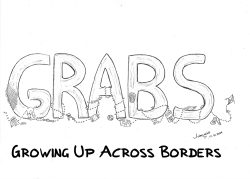ABOUT GRABS
Hello. Thank you for showing an interest in the GRABS project and visiting our website.
GRABS stands for Growing Up Across Borders and it is a five year project where we explore the lived experiences of young people growing up in situations of forced migration and (im)mobility. Co-developing and using creative participatory research methods, we seek to better understand how youth knowledge, lived-experiences, agency and ideas shape their pathways into adulthood across borders. You can learn more about how we work – our values, ethics, and methods, and where we work. GRABS is composed by a small team of five researchers (you can read more about our team here) and many collaborators and partners (you can read about our partners and collaborators here).
The project is funded by the European Research Council (ERC), Grant 101141171, and hosted at the Université Paris 8 and the CRESPPA research centre (Centre de recherches sociologiques et politiques de Paris).
